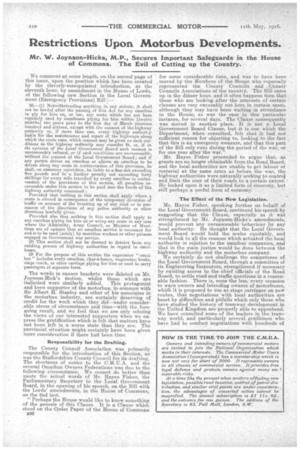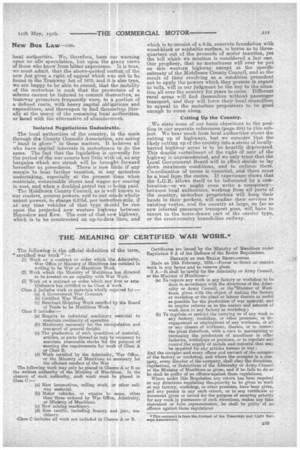Restrictions Upon Motorbus Developments.
Page 8

Page 9

If you've noticed an error in this article please click here to report it so we can fix it.
Mr. W. Joynson-Hicks, M.P., Secures Important Safeguards in the House of Commons. The Evil of Cutting up the Country.
We comment at some length, on the second page of this issue, upon the position which has been created by the cleverly-manipulated introduction, at the eleventh hour, by amendment in the House of Lords, of the following new Section in the Local Government (Emergency Provisions) Bill :
20.—(1) Notwithstandinganything in any statute, „it shall not be lawful after the passing of this Act for any omnibus to ply for hire on or use, any route which has not been regularly used by omnibuses plying for hire within [twelve months] two years prior to the first day of March nineteen hundred and sixteen, except With the consent of the highway authority or, if more than one, every highway authorLy liable for the maintenance and repair of the highways along which the route runs, which consent may be given on such conditions as the highway aothoritff may consider fit, Or, if in the opinion of Ilte Local Government Board such consent is unreasonably refused, or if sitcli conditions are unreasonable, without the consent of the Local Government Board ; and if any person drives an omnibus or allows an omnibus to be driven along any route in contravention of this provision lie shall, on summary conviction, be liable to a fine not exceeding five pounds and to a further penalty not exceeding forty shillings for every mile travelled by every omnibus in contravention of the provisions of this section, all penalties recoverable under this section to be Paid into the funds of the highway authority concerned : Provided that nothing in this section shall apply where a route is altered in consequence of the temporary diversion of traffic on account of the breaking up of any road or in pursuance of the directions of any police authority or other directions lawfully given. Provided also that nothing in this section shall apply to any omnibus plying for hire on or using any route in any case where the Admiralty, Army Council, or Minister of Munitions are of opinion that an omnibus service is necessary fer and is to be used [solely] by munition workers or other persons engaged on Government war service.
c2) This section shall not be deemed to detract fteam. any existing powers of highway authorities in regard to omnibuses.
(3) For the purpose of this section the expression " omnibus " includes every omnibus, char-a-banos, wagonette', brake, stage coach, or other carriage plying for hire or used to carry passengers at separate fares.
The woDds in square brackets were deleted on Mr. Joynson-Hiek's motion, whilst those which are italicized were similarly added. This protagonist and keen supporter of the motorbus,. in common with Sir Albert H. gtanley and other of his. associates in the motorbus industry, are certainly deserving of credit for the work which they did—under consider„able stress of circumstance and time—with the foregoing result, and we feel that -we are only echoing the views of our interested supporters when we express the gratification which is felt that matters have not been left in a worse state than they are. The provincial situation might certainly have been given more consideration if there had been time.
Responsibility for the Drafting.
The County Council Association was primarily responsible for the introduction of this Section, as was the Staffordshire County Council fdr its drafting. The shortness of notice to tie C.M.U.A. and the several Omnibus Owners Federations was due to the following circumstance. We cannot do better than quote the actual words of Mr. Hayes Fisher, the Parliamentary Secretary to the Local Government Board, in the opening of his speech, on the Bill with the Lords' amendments, in the House of Commons, on the 2nd inst.
"Perhaps the House would like to know something of the genesis of this Clause. It is a Clause which stood on the Order Paper of the House of Commons B36
for some considerable time, and was to have been moved -by the Meinbers ofthe 'House who especially representedthe County Councils and .County Councils Associations of the country. The Bill came up in. the dinner hour, and it often -happens then that those who are looking after the interests of certain clauses are very excusably not here in certain cases, although they may have been waiting in attendance in the House, as was the case in this particular instance, for several days. The Clause consequently was moved in another place. It is not a Local Government Board Clause, but it is one which the Department, when consulted, felt that. it had not sufficient reason for objecting to, looking to the fact that this is an emergency measure, and that this part of the Bill only runs during the-period of the war, or for one year after the war.” Mr. Hayes Fisher proceeded to argue that, as grants are-no loner obtainable from the Road Board, and the local authorities -are unable to get labour or material at the same rates as before .the war, the highway authorities were naturally seeking to control and limit the user of their roads to a certain extent. He looked upon it as a limited form of economy, but
still perhaps useful form of economy: • The Effect of the New Legislation.
Mr. Hayes Fisher, speaking further on behalf of the Local Government Board, continued his speech by suggesting that the Clause, especially. as it was strengthened by Mr. Joynson-Hicks's amendments, would prevent any unreasonable • behaviour by any local authority. He thought that the Local Government Board would hold the scales equitably, and would look to all the reasons which actuated the local authority in relation to the omnibus companies, and that in the main justice would be done between the highway authority and the motorbus company.
We certainly do not challenge the competence of the Local Government Board, through a committee of its Engineering Inspeetors, strengthened if necessary by existing access to the chief officials of the Road Board, to settle road-and traffic questions in a reasonable fashion. There is, none the less, every occasion to warn owners and intending owners of motorbuses, whieli it is proposed to Use as stage carriages on new routes, that negotiations 'with local authorities a-re beset by difficulties and pitfalls which only those who have studied the history of tramway development in the United Kingdom are properly able to apprehend. We have consulted some of the leaders in the tramway world, and particularly several gentlemen who have had to conduct negotiations with hundreds of local authorities. We, therefore, base our warning upon no idle speculation, but upon the grave views of those who know from, bitter experience. It is true, we must admit, that the above-quoted section of the new Act gives a right of appeal which was not to be found in the Tramway Act of 1870, and it is also true, we are happy to be able to record, that the mobility of the motorbus is such that the promoters of a scheme cannot be induced to commit themselves, as tramway promoters frequently were, to a portion of a defined route, with heavy capital obligations and expenditure, and thereupon to find themselve_s literally at the mercy of the remaining local authorities, or faced with the alternative of abandonment.
Isolated Negotiations Undesirable.
• The local authorities of the country, in the main through the County Councils Association, are acting "hand in glove" in these matters. It behbves all who have capital interests in motorbuses to do the same. The fact that the legislation is avowedly for the period of the war counts but little with us, as any bargains which are struck will be brought forward hereafter as precedents. There is now little if any margin to bear further taxation, in any motorbus undertaking, especially at the present time when materials, consumable stores and wages are soaring in cost, and when a doubled petrol tax is being paid.
The Middlesex County Council, as is well known to -our readers, possess powers, and to our minds wholly unjust powers, to charge 0.375d. per motorbus-mile, if at any time vehicles of that type should be run upon the projected new western highway between Hounslow and Kew. The cost of that new highway, which is to be constructed on up-to-date lines, and . which is to consist of a 6-in, concrete foundation with wood-block or asphaltic surface, is borne as to threequarters out of the proceeds of motor taxation, yet the toll which we mention is considered a fair one. Our prophecy, that no motorbuses will ever be put on this western highway except at the specific entreaty of the Middlesex County Council, and as the result of their resolving as a condition precedent not to apply the powers which they possess in regard to tolls, will in our judgment be the key to the situation all over the country for years to come. Different rural areas will find themselves without passenger transport, and they will force their local councillors to appeal to the motorbus proprietors to be good enough to come along.
'Cutting Up the Country.
We state some of our basic objections to the position in our separate references (page 204) to this subject. We hear much from local authorities about the cutting up of highways, but we consider that the likely cutting up of the country into a series of locallybarred highway areas is to be heartily deprecated. This drastic curtailment of the right of user of the highway is unprecedented, and we only trust that the Local Government Board will in effect decide to lay down maximum conditions, and to enforce them. Co-ordination of terms is essential, and there must be a lead from the centre. If experience shows that the L.G.B. allows itself to be influenced by a combination—or we might even write a conspiracy— between local authorities, working from all parts of the country, motorbus proprietors will keep their hands in their pockets, will confine their services to existing route& and the country at large, -so far as new internal passenger transport goes, will have to revert to the horse-drawn cart of the carrier type, or the cross-country branch-line railway.




















